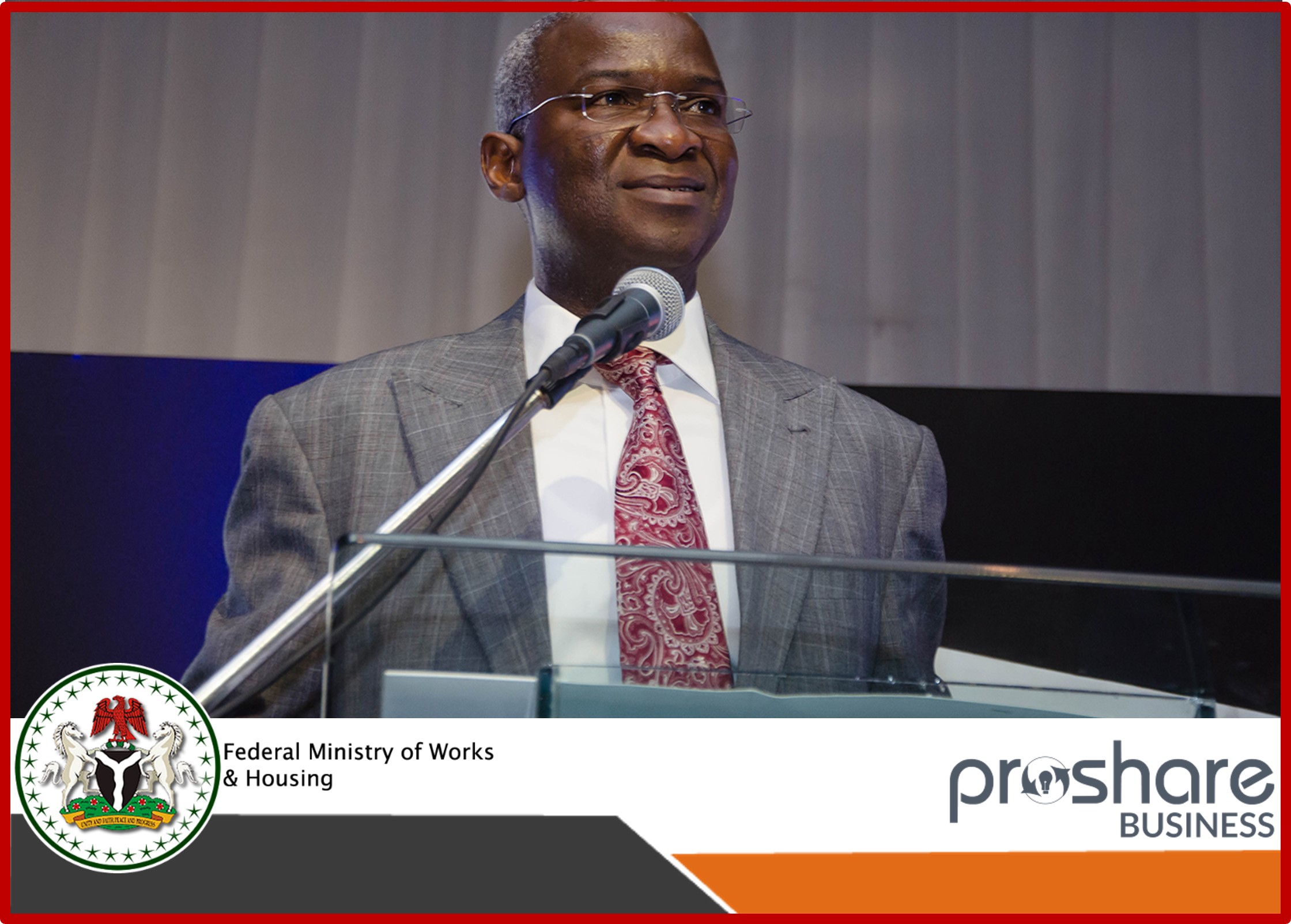Saturday, October 16, 2021 / 3:05 PM /By Babatunde Raji Fashola / Header Image Credit: The Guardian NG
Being Speech deliveredat the 2021 Annual Olumide Memorial Lecture Organized By The NigerianInstitution Of Surveyors By Babatunde Raji Fashola, San On 14th October 2021 AtThe Chida International Hotel, Abuja.
Ladies and Gentlemen,
I do not know the criteria for choosing the speakersat the annual Olumide Memorial lecture which I am told started in 1982.
Therefore, I do not know what qualifies me to be thisyear's speaker, but I am delighted to be here for one reason only, theopportunity to celebrate a true Nigerian professional, late Surveyor CyprianTheodosius Olumide.
This is a matter hopefully that I will return to:-Professionalism in the Nigerian space.
While I am enthused to be here, my presence is onethat is with some difficulty.
This difficulty arises largely because there is somuch to talk about and to do and organizers have very smartly and to my ownconsternation, decided that I "...will be free to choose the topic of your (my)lecture".
This is very difficult, not only because I did not havethe privilege to ever meet Surveyor Olumide, and my efforts to find out moreabout him, using electronic search engines have not produced a lot ofinformation.
This is something I hope the Nigerian Institution ofSurveyors will remedy sooner rather than later.
But my difficulty has not been made easier by the factthat while the Institution must be commended for giving me very early notice,since June 2021, I still have not settled on a topic.
I must therefore express deep regret that I do not yethave a topic, but I will speak about various things in the hope that I canweave a theme that pays commendable tribute to Surveyor Olumide's work andservice to Nigeria and humanity.
So let me start with a personal story, and I willtitle the story:- "Mummy, who is a chief...? I want to be a chief".
One evening around 1972, a young boy was watching thetelevision with his mother, and NTA was featuring the announcement of aconferment of a chieftaincy by the then Oba of Lagos, Oba Adeyinka Oyekan, on aprominent Nigerian.
There was so much fanfare, and the young boy, notunderstanding what all the fuss was about, but nevertheless enthralled by thegrandeur, asked his mother: "Mummy who is a chief? I want to be a chief".
His mother then went on to explain to her son that ifhe wanted to be a chief he had to be a professional, work hard, subscribe tothe highest values and serve people.
Of course, the mother did not miss the opportunity tochallenge her son by stressing that the road to the journey of chieftaincy thathe desired, started with schoolwork and that he must improve on his schoolworkeffort and get good grades.
What you might ask is the relevance of this story?
That young boy later became a professional, a legalpractitioner, he ended up as a public servant, but has seen the erosion of theinstitution of chieftaincy as described by his mother; because the values andstandards have been compromised by some people, men and woman, who havedevalued what the chieftaincy title once represented- a building block of society.
That young boy no longer wants to hold a chieftaincytitle. He's content with who he is not what he is called. That young boy isyour guest speaker today.
Please remember this story as I will come back to it.
The second story is titled Apalara.
Alfa Bisiriyu Apalara, history records, was a cleric.The story is about his disappearance, till today, in what led to a famousmurder trial. The scene was set around Ebute-Metta in Lagos and thecircumstances suggest that his body was dumped in the Lagos Lagoon, somewhereunder the 3rd Mainland Bridge which was not then conceived or built.
What the police investigators had to go by were piecesof evidence such as the fact that his "belongings were found in his house therewas an attack on him..." "that blood (which was human) was found leading fromthat place, Tapa Street, to the foreshore..."
This event happened on the night of the 3rd January1953, and the trial and appeal to the West African Court of Appeal wasconcluded on 25th February 1954 affirming the conviction of Joseph OgunbayodeOgundipe and 9 others for murder.
The trial was concluded in a record 13 months inNigeria.
But the story here is not just about the speed oftrial, but the professionalism of the lawyers and, more importantly, thepolice officers who investigated the case.
One of them was Adeyemi Sapara, perhaps one of theforemost but uncelebrated Criminal Investigation detectives that our countryhas ever produced.
The story is relevant because these men showed "exemplary devotion to duty" a character trait of late Cyprian TheodosiusOlamide.
The third story is that of Njovens.
Patrick Njovens, Y.L Bello, Alhaji Amusa Abidogun andChief Samuel Taiwo "ST" Oredein (a famous political figure) were triedand convicted for abetting the commission of a robbery and of receiving stolenproperty; the 1st (Njovens) the 2nd (Bello) and the 3rd (Abidogun) wereconvicted of accepting gratification and of failing to arrest persons known tohave committed offenses of armed robbery.
All the four accused were convicted of harbouringknown offenders.
The offense took place on 13 April 1971 at a placebetween Ilorin and Bacita in Kwara State.
The relevance of this story is that on the 3rd of May1973, the case, including the appeal to the Supreme Court, had been concludedwithin two years and one month, by the judgment of the Supreme Court deliveredon 3rd of May 1973.
This is the story of professionalism, dedication toduty and a resolve not to be compromised.
The men who made history possible are the policeprosecution witnesses who were not afraid to investigate and testify againsttheir superiors and a politically connected fourth accused.
The first second and third accused persons were policeofficers.
But that did not matter to men like Jacob AbiodunShangobiyi, the superintendent of police who testified for the prosecution anddescribed the first, second and third accused persons as follows
"I know accused one he was my immediate senior officerat the State's C.I.D., Ibadan. I know accused two he was the officer I/C inCrime Section, State's C.I.D., Ibadan. I know accused three, he was attached tothe Provincial Crime Branch, Central Police Station, Ibadan".
There were other testimonies by police officers likeJacob Olaniyonu Olarinde, Assistant Commissioner of Police (9th ProsecutionWitness) Michael Oshineye Showale, Deputy Superintendent of Police (13thprosecution witness.)
To the best of my knowledge these great men, who forthe love of country, committed to duty at great risk, probably never received anational honour or a chieftaincy title.
It is tragic that it was the fourth accused, ChiefTaiwo Oredein, who was a chief and I wonder what Shangobiyi, Olarinde and Showalewould have felt were they then offered chieftaincies.
It is their devotion to duty that commends them to me,to share with you if you did not know, or to remind you, if you knew, on a daywe gather to celebrate excellence, devotion and professionalism in the name ofSurveyor Olumide.
But that is not all.
They represent shining examples of what we have donebefore and what we can do again, if we commit, and what we must do.
This then takes me to the next story, the debate aboutstrong men and strong institutions.
This story, and the circumstances that brought it up,took place in my house this year on Eid-El-Kabir day when we were discussingour nation, and the reference was made to the statement by the former AmericanPresident about the need for strong institutions rather than for strong men.
I saw it differently and I said so.
My view is that there is nothing esoteric aboutinstitutions, because the story of institutions is a story of men and women.
When institutions do well it is men and women who havedone well and vice versa.
The Nigerian Police that investigated and prosecutedthe Apalara and Njovens cases very professionally still exists as an idea andcreature of our Statute.
But it is a different era.
Where are its Saparas, Olarindes, Showales,Shangobiyis, MD Yusufus, Kam Salems, Musiliu Smiths, Kafaru Tinubus, EtimInyangs and Louis Edets?
How many now want to be like them and better?
Let me be clear, this is not an X-Ray on the police.It is simply an institution about which I can find some judgements/documents totell this story.
There are many other professionals such as judges,forensic pathologists, court clerks, lawyers who made these achievementspossible.
Not only is that Nigeria of efficiency andprofessionalism of the Olumide era possible, a better one is achievable.
And this takes me back to the debate about men/womenand institutions.
I hold the clear view that every institution, nation,ministry, department, agency, company, church, mosque, etc represent nothing but ideas.
From this alone, the central role of men and women isalready manifest. Who has ideas but us?
Those ideas then develop into paper, made by us in theform of laws, certificates or licenses, created and issued by men and women tocreate a Country (constitution); Company (certificate of incorporation) banksor telecoms (licenses).
What is then done with these creatures is a functionof how men and women behave and nothing more.
The point was then made about how the Senate of theUSA acted institutionally to save America's democracy during the "Contestationof the 2020 elections" on January 6, 2021, in the aftermath of the onslaught ontheir parliament building.
But the argument of any inherent institutionalstrength in that senate or any organization collapsed, when I pointed out that:
a) The Vice President of the country Mike Pence, choseduty over self or office, because he accepted that his joint ticket had beendefeated and it was his duty like many who held that office before, tolet the right thing be done;
b) if he had followed the wishes of the President, hisaction as an individual would have brought an experiment of over 200years to its knees;
c) in 2015, when Goodluck Jonathan decided to concedethe elections to Muhammadu Buhari, some Orubebe-minded members of his partywere acting in concert to frustrate the process, while the likes of BishopOnaiyekan and General Abdulsalam Abubakar were in the Villa urging a solution;
d) that when President Yar'Adua sadly passed in 2010and we were heading for the precipice, it was the act of men and women, ratherthan any institution, that steered the nation in the right direction to heraldthe emergence of a Jonathan presidency, notwithstanding that they were clearprovisions as to what should happen when a sitting president dies in our constitution.
Ladies and gentlemen, my conclusion on this point isthat it is the consistency of good deeds, good conduct that makes theminstitutionalized in a way that we can then speak of an institution.
One error, just one, in the recruitment process of theleadership or personnel becomes the fly in the ointment that makes nonsense ofthe work of generations and brings what has been institutionalized intodisrepute and infamy.
Surveyor Cyprian Theodosius Olumide is an example ofthe type of good men and women we all need to build institutions in our publicand private life.
I promised earlier to return to the issue ofprofessionalism.
I do so now by returning to the first story aboutbeing a chief, the second one about Apalara, and a third about Njovens.
What runs through them all is professionalism.
The lawyer who was honoured with a chieftaincy, thepoliceman, lawyers judges and others who dispensed justice and of courseSurveyor Cyprian Theodosius Olumide, all of whom did their work very well.
The question to now ask is whether such speedy andefficient disposal of cases still endures.
The court has not significantly changed in structure;but its personnel quality has certainly changed.
We have recently read reports on the Chief Justice ofNigeria interrogating the process of counter and conflicting court orders inrelation to political matters.
While we wait for the outcome of the interrogation, itis clear that the values, professional integrity and dedication to duty of someof the personnel involved in the administration of justice have not retainedthe Olumide-like dedication to duty.
The court buildings and the judges remain but are theprosecutors assisted with the quality of investigation of the Sapara-type thathelped the court conclude that the blood involved was human and not that of ananimal and to be able to convict without finding a body.
Would it be possible in that era of professionalism tosuggest, in the way that it was recently suggested, that a sum of missing moneywas swallowed by a snake?
What base thinking and assault to logic brings thatkind of reasoning into contemplation if not a lack of professionalism and anopportunity to capitalize?
Ladies and gentlemen, I reiterate that the quality ofany institution, country, business, ministry, development agency, school orotherwise is a direct result of the quality of its human capital.
I think I have now found my topic, and if you permit,I will conclude with it.
It is: "Human Capital and Institution Building".
Thank you for listening.
About the Author
Babatunde Raji Fashola, SAN is the Honourable Ministerof Works and Housing and former Governor of Lagos State
Related News on Babatunde Raji Fashola
- Fashola Harps on Inclusiveness, Sustainable Growth and Development
- Zainab Ahmed, Fashola To Speak At Turkey-Nigeria PPP Knowledge Webinar
- Vibrant Capital Market Critical to Sustainable Financing of Infrastructure in Nigeria –Fashola
- Nigeria has Generated 1000mw of Power Annually Since 2015-Fashola
- Fashola Writes President Buhari, On TCN's Recovery Of Government Assets
- NASS' Recourse to Personal Attacks Fails to Address the Issues I Raised – Fashola
- How To Unlock The Potentials Of The Housing Sector - Babatunde Fashola
- Road repairs: FG'll reimburse states through bonds, says Fashola
- Governor Fashola Letter To Lagosians
- Fashola Calls for Removal of Military from State - Full Speech
Related News
- WIMBIZ Celebrating Legacy @ 20; Unveils Conference Details
- NECCI Public Relations Roundtable Holds Its 21st Edition
- 17th IoD Nigeria President, Dr. Ije Jidenma to Prioritize Inclusiveness, Digital Transformation
- Muhammad K. Ahmad, Okoli, Ighodalo to attend the 17th Presidential Investiture of the IoD Nigeria
- CIBN and NJI to Raise Awareness for Judicial Officers on Banking Contemporary Issues
- CIBN Inducts 672 New Bankers, Tasks Banks on Leveraging Technology
- Kagame, Buhari to Grace 14th Annual Banking and Finance Conference
- BOI MD Kayode Pitan bags CIS Fellowship for Supporting MSME Development in Nigeria
- CIBN Partners Osun State in Capacity Building for Finance Personnel
- Oyo State Allocates Landed Property to CIBN for The Building of Branch Secretariat
 Lagos, NG • GMT +1
Lagos, NG • GMT +1











 1732 views
1732 views











 Sponsored Ad
Sponsored Ad
 Advertise with Us
Advertise with Us









